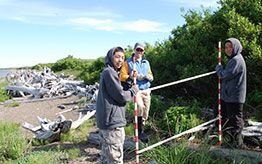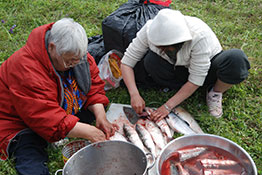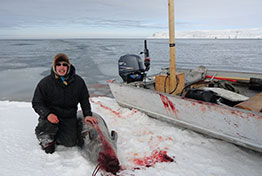Nunavut/Our Land
Nunamek yuucingqertukut/Our livelihood is provided by the land
In the past, the Bering Sea coast was dotted with hundreds of seasonal camps and small villages. Elders said that people stayed in places where they could find food.
According to Edward Phillip of Alakanuk:
"They say in the past they used to stay in places where they could stay fed on what they caught. Villages were evidently scattered, not situated far from one another."
Beginning in the 1960s, families gathered in central sites so that their children could attend school, and many small villages were abandoned. Today only 57 villages remain of the thousands of camps and settlements spread throughout the Yukon-Kuskokwim region, an area the size of New York state.
Although modern villages may look fixed with their frame houses, schools, churches, airports, and community halls, people continue to move throughout the land, traveling great distances for a wide range of harvesting activities. Today as in the past the Yup'ik way of life is bound up with the seasonal cycling of fish, sea and land animals, plants, and birds.
As Ray Waska says:
"Where there's food, I go see it."
Nuna qantaqaput/The land is our bowl
In the stories they told, elders were not concerned with boundaries or land ownership but with describing how places were used by everyone in the past, underlining the gulf between their understandings of rights to land based on generations of use and non-Native views of land as a commodity subject to individual and corporate ownership.
As Paul John explained:
"The white people revealed a plan that people should only hunt on corporation land. They won't be able to travel to a particular place to subsist. I told them about our ancestors' saying that in the past our people ate together from the land like [they were eating] from the contents of one bowl. We carry out the custom of camping [wherever we need to subsist.]"
John Phillip emphasized the importance of the land as well as the instruction never to harvest more than one can use:
"It is especially important to include our land here where we subsist and talk about it. The land was theirs. They ate its animals, they ate its plants, they ate the fish in its rivers, they ate the food from the ocean and took what they wanted.
But they had instructions, and I was told many times, 'Although things are abundant, don't catch something that you will leave behind, that will rot.' That's the admonishment I was given.
And I tell my children and other people down on the coast that although things are abundant, to determine what they need and bring home what they could use and not to kill ones they would leave behind. That's something that must be included also."
Learn more
Nunamek tua-i wangkuta naullruamta, nuna pikluku tamana waniwa / Since we grew from the land, the land is ours at this time
 Taumek wani nalluyaguteksailamku wii man'a piciuluku wangkuta man'a nunavut wangkutnun qanrutkumallruuq, wangkutnun pikaqniluku atu’urkaqniluku-llu. Tuaten tua-i tamatumek qanellranek wii apaurluma wangnun nalluyaguteksailamku wii qanrutlaranka ingkut, makut-llu aipaiput tekitaqata nalqigutaqluki tamatumek.
Taumek wani nalluyaguteksailamku wii man'a piciuluku wangkuta man'a nunavut wangkutnun qanrutkumallruuq, wangkutnun pikaqniluku atu’urkaqniluku-llu. Tuaten tua-i tamatumek qanellranek wii apaurluma wangnun nalluyaguteksailamku wii qanrutlaranka ingkut, makut-llu aipaiput tekitaqata nalqigutaqluki tamatumek.
Tua-i tamana maa-i quyakngamku kan'a egelrutengnaqlaraqa waniwa man'a nunavut wangkutnun taisngacia, wangkutnun atu’urkaqniluki, nerangnaqvikluku-llu, natmun ayagayuunata nunamta taugaam nuniini neqiinek angliluta.
Anglicaumaunga wii Kangirnam neqiinek tamaa-i wall'u ungungssiinek avatiini wall'u atsainek makunek nunami nautulinek, nunamteni tua-i makunek. Imkut-llu makut uugnarayaraungermeng mouse-at neqaitnek tamakunek neqengqerraqluta waniwa maa-i uksuarpak amlleraqata amllelaameng.
Nunamek tua-i wangkuta naullruamta, nuna pikluku tamana waniwa. Qanrutlaranka ugkut ayagyuat ugkut pingnaqlaasqelluki tamaavet nunamtenun waten-llu qanrucimallruama apaurlumnek, 'Wavet tekitellria nunamun neqkaq elpet wani neqkaqan. Taisngauq, piliasqestiinek nunamun tekiskan tuavet neryugngaan tuqulluku.' Mat'umek maa-i qanellranek apaurluma qanrutamci tua-i  nalluyaguteksailamku. Tua-i, quyana.
nalluyaguteksailamku. Tua-i, quyana.
Since I haven't forgotten this, what we were told about our land was true, that it was to be ours and to be used by us. Since I haven't forgotten what my grandfather said, I tell those people over there, and when our [non-Native] counterparts arrive, I explain that to them.
Since I am grateful for that [land] down there, I try to lead my village, as our land was given to us, and I tell them that it was to be used by us and we were to subsist off of it, and we never traveled anywhere but grew up and were raised eating the foods around our village.
I was raised on the fishes of Kongiganak or the animals around it or its berries that grow on the land—things around our village. And even if they're small mice, our foods are mouse foods at this time, since there are many in the fall when they are abundant.
Since we grew from the land, the land is ours at this time. I tell the young people down on the coast to make efforts at subsisting on our land, since I was told by my grandfather, "Food that arrives at this land is your food. It is given by the one who created it, and if it arrives there at that land, you can kill it and eat it." I'm telling you about what my grandfather said since I haven't forgotten it. That's it, thank you.
John Phillip, Kongiganak
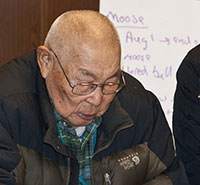
Elders also stressed how important it was to continually observe one's surroundings when traveling on the land and sea. A person should pay attention to everything, even small things like grasses and bushes. As they say, grasses can't move, bushes can't move, and recalling their location can guide a person while traveling in the wilderness.
John Phillip recalled:
"This is what they used to tell me inside the qasgi, this is what I used to be told when I was young by my grandfathers, 'You poor thing, you poor boy, pay attention as you are living, and observe everywhere you travel and observe everything you see.' I haven't forgotten those things; I speak of this briefly to the people down the coast, to our young men.
Today people travel at fast speeds using snow machines. Many fail to recognize places they pass and lose their way. Elders instruct that continual observation is still important and can be a matter of life and death."
Learn more
Murilkenaurturluten pikina/Continually observe things
 Nacigatullruunga tamaa-i, wangnek-wa tua-i cuqlua-ll' pilliunga. Apaurluqa qimugciyuitellruuq. Waten taugaam tua-i ikamrarrlainarluni augkunek qamigaukarnek aptukngaitnek aturluni. Wagg'u-q' qimugciquni pitarkanek pillurqinayukluni qimugtenun melqulegnek-wa tua-i. Kiingan akikengnaqtullruamegteki tamaani pitaqsuumirluki tangelteng pitullrulliniamegteki.
Nacigatullruunga tamaa-i, wangnek-wa tua-i cuqlua-ll' pilliunga. Apaurluqa qimugciyuitellruuq. Waten taugaam tua-i ikamrarrlainarluni augkunek qamigaukarnek aptukngaitnek aturluni. Wagg'u-q' qimugciquni pitarkanek pillurqinayukluni qimugtenun melqulegnek-wa tua-i. Kiingan akikengnaqtullruamegteki tamaani pitaqsuumirluki tangelteng pitullrulliniamegteki.
Tua-i caqerlua ayaucanga, tua-i-w' maligcamku ing'um qanellratun 'Murilkenaurturluten piniartuten.' Umyuartequa, 'Camek-kiq murilenauresqanga'' Camek muirlkenaullerkamnek wii umyugaunii.
Tua-i-ll' caqerluni pianga murilketailkuma-gguq elluarrlua yuiqumi ellarrluguskanga-llu pingaitua. Cat-gguq makut can'ggaungermeng nugtarrluteng nauyuitut. Qang'a-ll' uqvigaat cimirluteng natmun nugtarrluteng piiyuitut. Qang'a-ll' nanvat murilkelluki.
Maa-i wangkuta kinguqliput maligtengluki muilkessuirutukut eglertaqamta tua-i-w' cukaicesciigalamta pilliukut waten pitaringramta. Cukanralriani amllermek kiartevkenani elitaqerkaq tamarluku eglercaurtut maa-i. Nani-llu uitallerteng iliin umyuaqevkenaku yuut ayuqenrilameng.
Amllerem yuum ayagatungermi maa-i kinguqlimta makut yuilquq nallulriacetun ayuqaat maa-i, tua-i-wa cat elitaqerkateng tangerrluki egmian kiturluki nalluyagulluki-ll' kingutmun tayima.
Ellarrliraqan-llu arcaqerluku nanluciitevsiarnaqlartuq tangyunaunani-llu piaqami; qaill' yaaqvanun tangerrnaunani. Taugaam alerqutullruanga, qaill' elitaqisciiganii pikuma ayagiinarpek'nii arulairlua ella erneq tamalkuan assiiterrlainarngaitniluku. Taugaam qanikciurun, cikuliurun kiigkenka tua-i taquaqellriacetun ayuqlukek pisqellukek. Qanikciurutem ikayurciqnilua qaill' nengelmek-llu uqruciurlua-llu pingnaqesqellua.
Taugaam inerqurrlua cali, uqviarnek, uqviarni pikuvet [pikuma] uq'lirneratnun nunakiuresqevkenii. Patucugngaanga-gguq tuani uqviaret uq'lirneratnun pikuma. Maavet taugaam taqurratnun, mengliitnun, tuaten pisqellua.
Cali qanikciurun qan'ga-ll' cikuliurun peggluku tuavet pisqevkenaku, qelekluku patuskanga-gguq qanikcaam epsugngaunga. Qaill'-gguq pisciigalkuma tugaurluku ukiskumku air-amek cikiryugngaanga wangnek ikayuryugngalua unguvallerkamnun. Tuaten  pitalriamek.
pitalriamek.
I used to want to go with [my grandfather], probably to see what I was capable of at the time. My grandfather didn't go by dog team. But he always traveled by sled, using those [small kayak sleds] they called qamigaukaraat. If he used a dog team, he was afraid that he would let animals, fur animals, flee because of the dogs. Since they were their only source of income back in those days, they evidently desired to catch what they saw.
One day, when he brought me, or when I accompanied him, like that person over there said, "Continually observe things." I was thinking, "I wonder what he’s telling me to observe?" I couldn't think of anything that I was supposed to observe.
Then one day he said to me that if I wasn't observant, that I wouldn't do well in the wilderness, if the weather became bad while I was out. He said things, even grass, don't move and grow elsewhere. Or the willow and alder bushes don't move elsewhere. Or he told me to observe the lakes.
Today, starting to follow our young people, we no longer observe things when we travel, since we probably can't travel slowly although we've become this old age. When traveling at a fast speed, one doesn't look around at their surroundings a lot and loses the opportunity to recognize things when they travel today. And sometimes they don't think about where they are located as people are different.
Although many people travel, our young people don't know the wilderness today, as they look at the places that they should recognize and pass them right away and forget them as they are returning from traveling.
And when the weather is especially bad, one becomes increasingly disoriented when it is such that there is no visibility; there is no way to observe a great distance. But [my grandfather] used to instruct me, if I cannot recognize a place, not to continue to travel but to stop, that the weather cannot be bad every day. But he said to keep only the shovel and the ice pick with me like they are my provisions. He said the shovel would help me and he would tell me to try to create a windbreak from the cold weather.
But he also admonished me that if I went along the willows and alders, not to prepare a place to stay along their sheltered side. He said [snow] could cover me if I went along the sheltered side of willow and alder bushes. But he told me to go along their front, along their edges.
Also, he told me not to just abandon the shovel or the ice pick there, but to keep it with me, that if the snow covered me, I would suffocate. And he said if I am unable to do anything, if I chop it and make a hole in it, it can give me air and I can help myself toward staying alive. That's all I'll say.
Frances Charlie, Scammon Bay
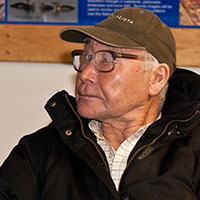
Geologist Nick Riordan shows Deon Aketachunak and Juan Akaran how to measure the coastline north of Kotlik, July 2011.
Photo Credit: Ann Fienup-Riordan
Rita Angaiak working on food during the July 2007 trip around Nelson Island.
Photo Credit: Ann Fienup-Riordan
A successful seal hunt in Toksook Bay, April 2012.
Photo Credit: Simeon John

